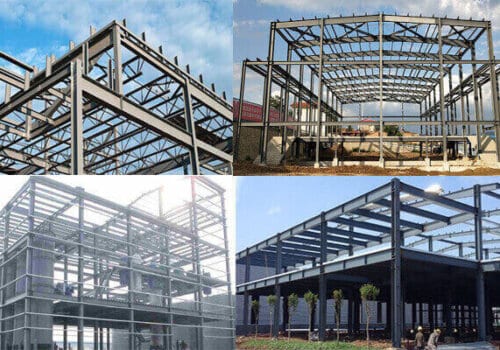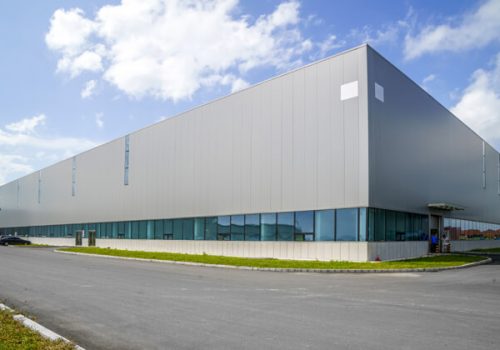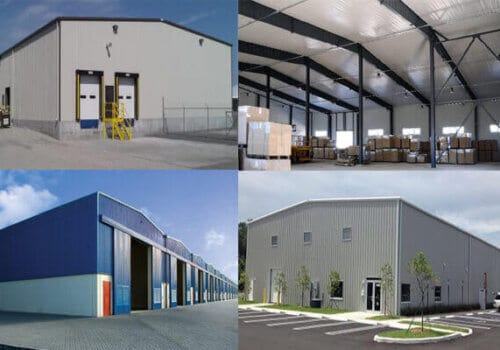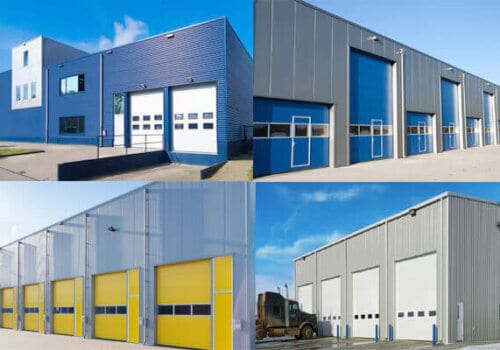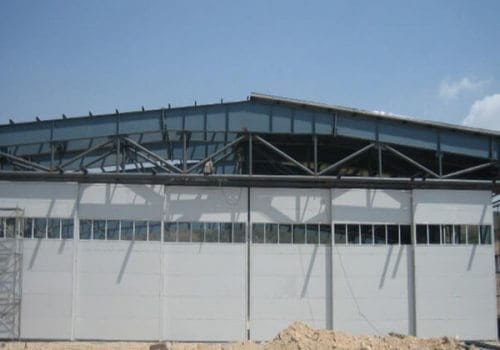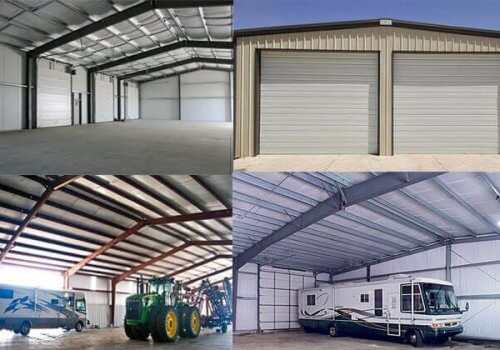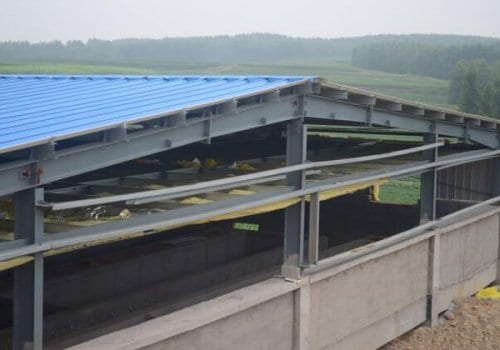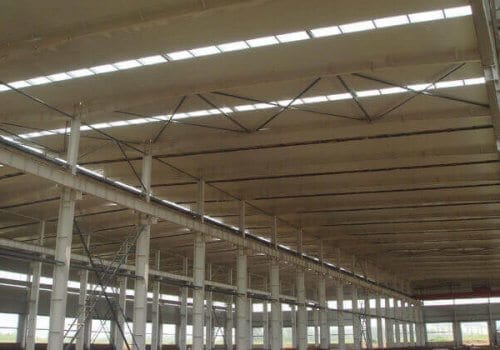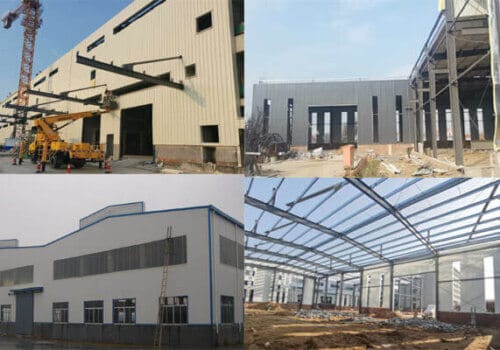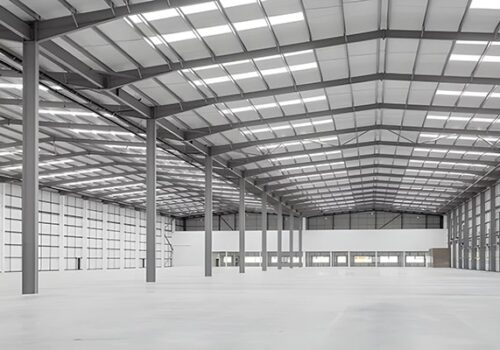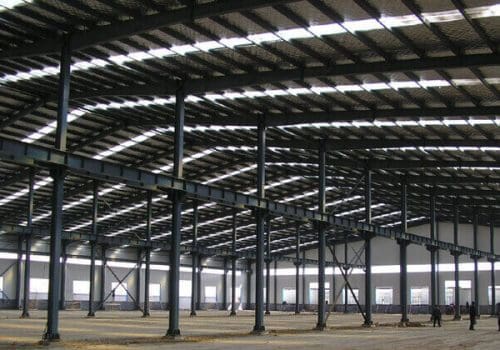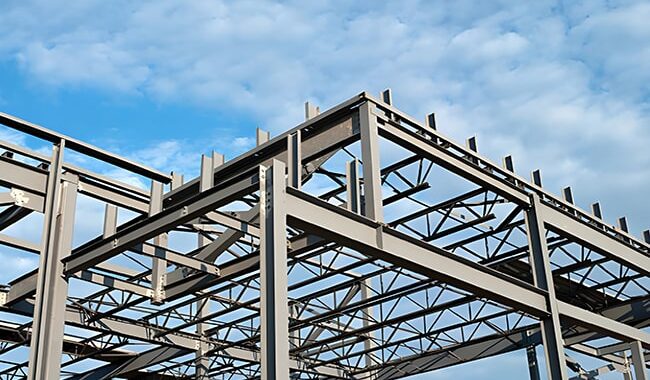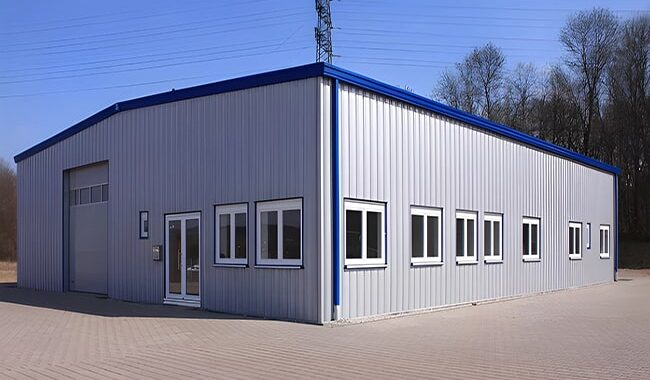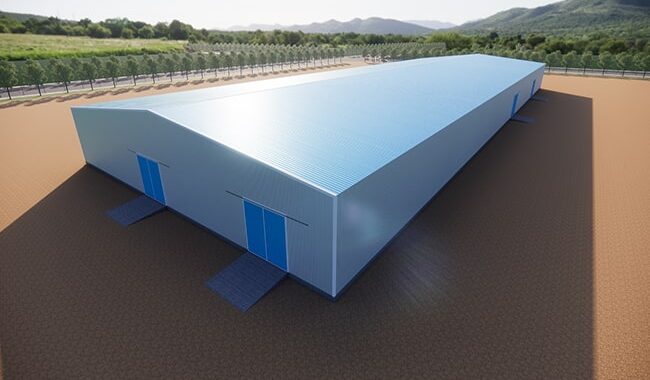A steel frame is a structure made of steel, usually connected by welding, bolting, or riveting steel beams, columns, bracing,…
If you’re searching for steel buildings for sale, you’ve probably already heard about this modern, alternative building structure. But what makes it so appealing? The answer lies in its unparalleled durability, versatility, and affordability. Whether it’s a large industrial warehouse, a shopping mall, or an office building, steel structures offer superior advantages over concrete. In this guide, we’ll take a deep dive into what makes these steel giants unique, explore the various types available, and provide key insights on how to find the best steel building for your needs.
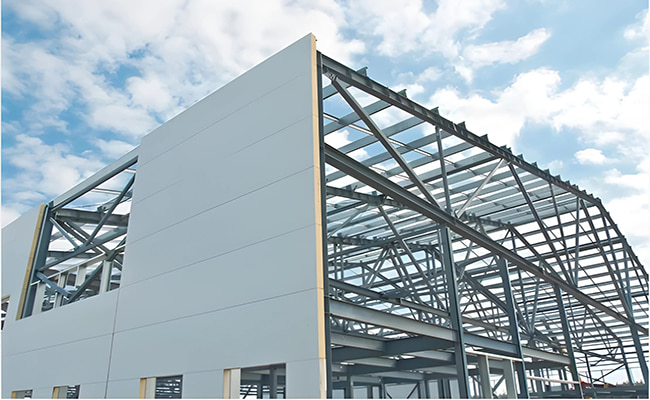
What exactly is a steel building?
Steel buildings are a new type of building system, which are buildings that use structural steel to form a load-bearing structure. Compared to traditional concrete buildings, which usually use steel plates and columns, beams, trusses, and other components to create a load-bearing structure, steel structures replace reinforced concrete and have higher strength and better earthquake resistance. They are widely used and can be used in industry, agriculture, commerce, and even residential areas. The high strength and uniformity of steel make the steel structure have good plasticity and toughness, and it has the advantage of easy maintenance, making it the first choice for many buildings.
What makes steel buildings so different from traditional construction methods? The first is efficiency. The construction period is significantly reduced since the components can be made in the factory and installed on-site. The other is environmental protection. Since steel can be reused, it dramatically reduces construction waste and is more environmentally friendly. Therefore, it is widely used in various types of buildings in countries worldwide.
The Type of Steel Buildings For Sale
According to the purpose and structural form, steel buildings can be divided into the following categories:
Industrial buildings: such as factories, warehouses, logistics centers, etc.
Commercial buildings: such as large shopping malls, exhibition halls, office buildings, etc.
Residential buildings: such as high-rise apartments, villas, etc.
Bridge buildings: such as highway bridges, railway bridges, etc.
Cultural buildings: such as stadiums, museums, theaters, etc.
Special purpose buildings: such as petrochemical facilities, wind power towers, etc.
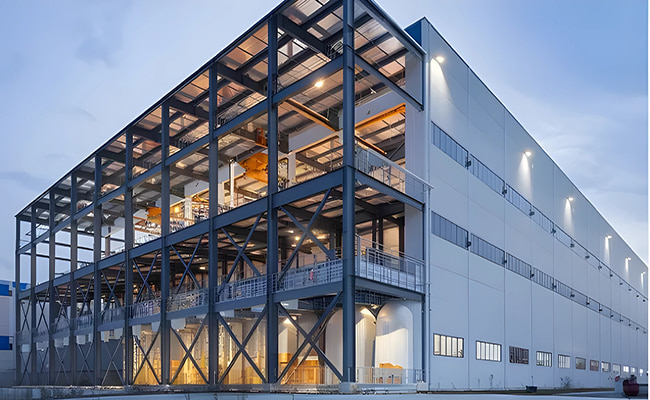
Development Trend of Steel Buildings
With the stability of the social environment, the rapid economic growth, and the enhancement of industrial capacity, steel structure buildings are ushering in unprecedented development opportunities. As a new form of construction, steel structure buildings have been widely used worldwide, and their technology is constantly maturing. In the future, the development trend of steel structure buildings will show the following characteristics:
1. Steel buildings are moving towards a high-quality development stage.
Intelligent production: The production and manufacturing of steel structure buildings have gradually achieved mechanization, intelligence, and precision, and manual intervention has been significantly reduced, thereby reducing labor costs and improving production efficiency.
Modularization and standardization: The trend of building modularization, standardization, and productization is becoming increasingly significant. The popularization of prefabricated buildings has not only accelerated the construction speed but also improved the quality and efficiency.
Integrated decoration: Prefabricated steel structure buildings will provide integrated decoration solutions in the future. The components are configured in the factory and can be put into use without secondary decoration after arriving at the site.
Green construction: Steel structure buildings will achieve greening from production to installation, reduce construction pollution and resource waste, and promote the environmental protection transformation of the construction industry.
2. Green and low-carbon prefabricated steel structure buildings lead the new trend.
As a form of energy-saving, environmentally friendly, and recyclable construction, prefabricated steel structure buildings are the key path to achieving the goal of carbon neutrality in the construction industry. Its characteristics include:
Low carbon emissions: Factory production reduces carbon dioxide emissions and solid waste generation at the construction site while reducing overall energy consumption.
Material recycling: Steel can be recycled to further reduce resource waste.
High assembly rate: The assembly rate, including pipelines, equipment, and interior decoration, can reach more than 90%, realizing a truly low-carbon and zero-carbon building.
3. Upgraded demand for steel for steel structure buildings
With the continuous advancement of technology, complex steel structure buildings such as super-high-rise and large-span buildings are increasing, and the performance requirements for building materials are also growing:
High-strength and toughness steel: meets safety and durability requirements and enhances seismic resistance.
Corrosion-resistant steel: extend the service life of the building and reduce maintenance costs.
Hot-rolled H-shaped and high-performance steel: gradually replace ordinary steel to meet the needs of complex building design.
4. The architectural shape is more natural and harmonious
In the future, the design of steel buildings will pay more attention to the integration with the natural environment and local culture:
Ecological color: adopt a color design that is coordinated with the environment.
Natural form: achieve smoother and more beautiful architectural lines through innovative design.
Cultural integration: combine local characteristics with modern architectural technology to show the regional cultural style.
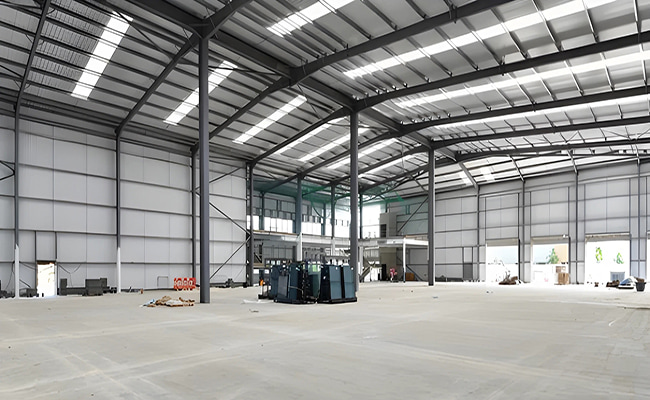
Factors affecting the Price of steel buildings for sale
The quotations from different suppliers may vary significantly for steel buildings for sale. It is necessary to clarify which factors lead to massive price differences to help customers make the best choice and ensure maximum cost-effectiveness.
1. The impact of design differences on the amount of steel used
The design plan of steel buildings is one of the core factors affecting the quotation. Different designers use different software, calculation methods, and design habits, and the design drawings generated will be very different.
Direct impact of the amount of steel used:
Too much steel in the design may lead to waste and increase construction costs; too little steel may cause safety hazards.
Different load requirements:
Whether to consider earthquakes, fire protection design, snow loads, wind loads, and other factors will directly affect the cost of steel used.
When comparing quotations, it is crucial to pay attention to the rationality of the design plan to ensure that the design meets both safety requirements and controls the amount of materials used.
2. Material selection of enclosure structure
The enclosure structure is another critical component of the quotation, usually including roof panels, wall panels, and floor decking.
Cost changes caused by material differences:
Local climate conditions and functional requirements will determine the choice of enclosure materials. For example, single-layer color steel plates are an economical choice in areas without extreme weather or insulation requirements. Insulation cotton rolls are usually more cost-effective for buildings requiring insulation than rock wool boards.
Choosing the proper enclosure structure according to project requirements can effectively control costs while ensuring functionality.
3. Differences in shape, size, and quality requirements
The specific shape, size, and quality standards of steel buildings will also lead to significant differences in quotations.
The impact of quality details:
Such as whether small components need manual polishing, galvanizing thickness, paint brand and thickness, door and window quality, etc., these details will widen the quotation gap.
Different configurations:
Special requirements such as corrosion-resistant coatings and fire-retardant coatings will also increase additional costs.
Customers need to reasonably evaluate the configuration content included in different quotations based on the purpose of the building and long-term use requirements.
4. Qualifications and location of the processing plant
The geographical location, qualifications, scale, and production capacity of the steel structure processing plant will also have a direct impact on the quotation.
Geographic location and logistics costs:
The farther the processing plant is from the project site, the higher the transportation cost.
Processing plant conditions:
Although large processing plants have advanced equipment and apparent economies of scale, their labor and qualification costs may be higher than those of small processing plants. On the contrary, although small plants offer low quotations, they may lack technical capabilities or quality control.
When comparing quotations, it is recommended that customers conduct on-site inspections of the actual situation of the processing plant and make comprehensive judgments based on quality, cost, and logistics to select the most suitable supplier.
5. The value of manufacturer service and experience
Choosing experienced manufacturers with timely technical feedback and high cooperation can effectively reduce the additional costs caused by technical problems. Even if you cannot visit the manufacturer on-site, you should fully understand the manufacturer through word of mouth and cases to ensure that the supplier’s quotation is consistent with the quality.
Steel buildings for sale fit the needs of your project.
Choosing the right steel building doesn’t have to be complicated. Just keep these tips in mind:
- Assess Your Needs
Before diving into the world of steel buildings, take the time to assess your exact needs. Is it a small warehouse, a large industrial complex, or a residence? Understanding the scope of your project will help you make the right choice. - Compare Prices and Features
Not all steel buildings are created equal. Prices can vary based on materials, design complexity, and manufacturer. Be sure to compare different suppliers and look for the best value, not just the cheapest price. Sometimes, paying a little more upfront means fewer headaches later. - Check Warranties and Support
Reputable manufacturers offer strong warranties for their products. Be sure to ask about the warranty, especially for large projects. Don’t forget to ask about customer support; the opportunity to get assembly help and future modifications is invaluable. - Read reviews and get advice.
Don’t just listen to what the supplier says – research is key. Check customer reviews and ask for advice from others who have purchased steel buildings. Insights from real customers can help you find a manufacturer you can trust.
Suppliers of Steel Buildings for Sale
Havit Steel has many years of experience in designing and producing steel buildings. The factory has a complete CNC steel structure production line with high processing accuracy. Advanced CNC equipment, from cutting to drilling, ensures a smooth installation. Our steel structure engineers can provide customized services for your building, optimize design solutions, and reduce overall budgets. If you need any steel building, don’t hesitate to contact us; we will serve you wholeheartedly.
FAQs about Steel Buildings for Sale
How long does it take to build a steel building?
Compared to traditional buildings, steel buildings are much faster to build. Since prefabricated steel components can be produced in advance in the factory, only assembly is required at the building site. Most steel buildings can be completed in a few days to a few weeks, depending on the size and complexity of the building.
How much does a steel building cost?
While the initial investment in a steel building may be higher than a traditional building, their durability and lower maintenance costs mean they are more economical in the long run. Steel buildings can also reduce overall costs by reducing construction time and man-hours.
How do you choose the right steel building supplier?
When choosing a supplier, evaluate its product quality, customer reviews, and service support. Ensure the supplier offers customized options that suit your needs and can provide detailed warranty and after-sales services. In addition, compare the prices and features of different suppliers to select the best cost-effective solution.
What are the maintenance requirements of steel buildings?
The maintenance requirements of steel buildings are relatively low. Steel itself is not easily affected by corrosion, insects, or rot. Regularly inspect and clean the surface of the building to ensure that there is no water accumulation or damage, and it will usually stay in good condition.
Are steel buildings suitable for commercial and industrial use?
Absolutely. Steel buildings are suitable for commercial and industrial use due to their structural strength and spatial flexibility. Whether it is an office, warehouse, retail store, or production workshop, steel structure can provide a large span, open space without supporting columns, convenient and efficient use of every inch of space.
What factors should be considered when purchasing a steel structure building?
When purchasing a steel structure building, you need to consider the following factors:
Purpose: clarify the functional requirements of the building and choose the appropriate size and design.
Budget: Choose the most suitable steel structure solution according to the budget.
Quality and warranty: Ensure the supplier provides appropriate quality assurance and after-sales support.
Customization requirements: Check whether the design can be customized according to your needs or expanded later.
